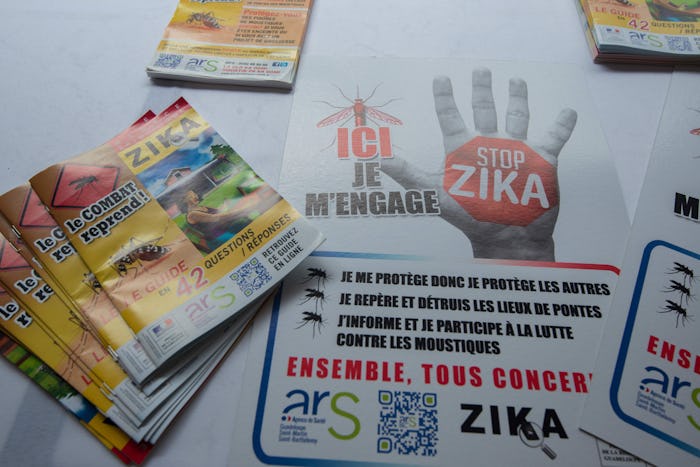News

What To Do If You Get A Mosquito Bite In A Zika Zone? Care Is Simple, But Effective
As Zika virus continues to spread worldwide, one of the most important travel-related questions is what to do if you get a mosquito bite in a Zika zone. First and foremost, it's important to remember that if you're not pregnant — and not trying to become pregnant — an infection with Zika will probably have few health consequences. However, if you or your partner are pregnant (or might become pregnant), there are a few simple yet important measures that can be taken if you suspect you might have Zika.
According to the Centers for Disease Control and Prevention, most people who contract Zika will be asymptomatic. For those who show symptoms, the most common are fever, rash, joint pain, and conjunctivitis. The incubation period for Zika is probably between a few days and one week, and symptoms of Zika, if you're symptomatic at all, should clear up within 7 days, according to the CDC. If you're bitten by a mosquito in a Zika zone and develop symptoms within two weeks of your last day in the area, see a doctor. They'll ask questions about where you were traveling. Depending on the situation, they might order tests for Zika and other tropical illnesses like dengue fever. If you test positive for Zika, there's really not much you can do but grab some bed rest, water, acetaminophen, and wait for the mild illness to pass.
The most important thing for someone who suspects they have Zika is to make sure they don't spread it to others. Most contract Zika via an infected mosquito, but there have also been reported cases of sexually transmitted Zika. Specifically, Zika spreads from an infected man's sperm. According to the CDC, in all but one case, the disease was transmitted sexually when the man was actively experiencing Zika symptoms, though it's possible to spread the virus sexually before symptoms emerge.
Men with pregnant (or potentially pregnant) partners should be just as careful about traveling to countries where Zika in prevalent as the woman herself should be. The CDC recommends that pregnant women should either abstain from sex (vaginal, anal, and oral) entirely, or use a condom every time they have sex for the remainder of their pregnancy if their partner might have been exposed to Zika. What's more, according to The New York Times, British health authorities recommend that men should always use a condom for 28 days after returning from a Zika zone, whether their parter is pregnant or not. After all, half of pregnancies are unintended, so it's perfectly plausible to transmit Zika to a partner who doesn't know that she'll soon be pregnant.
If you're pregnant and suspect you might have Zika, the most important step is to visit a doctor. According to The New York Times, the CDC's guidelines for pregnant women with suspected Zika are constantly in flux, but in most cases, the doctor will either order a blood test for Zika, a fetal ultrasound to look for signs of microcephaly, or both. Importantly, blood tests only detect the virus during the first week or so of the infection.
It's clear that monitoring for Zika is super important for pregnant women, women who are trying to become pregnant, or their partners. But if you don't fall into any of these categories, there is still an interesting, but somewhat unlikely, way that you might accidentally infect a pregnant woman. A person with Zika can transmit the virus back to a mosquito if the Zika-infected person gets a mosquito bite. From there, the infected mosquito can pass it back to a human. Wacky, right? For this reason, the CDC recommends that if you suspect Zika, you must avoid mosquito bites during the first week of the illness.
Unfortunately, there are still many unknowns about Zika. Many women want to know whether a past infection with Zika can affect future pregnancies. The answer appears to be 'no.' According to The Times, experts believe that "the virus does not appear to linger in the body, and people who recover from the infection are immune."
The news about Zika is rarely ever good, but future immunity? Sounds like a possible silver lining.